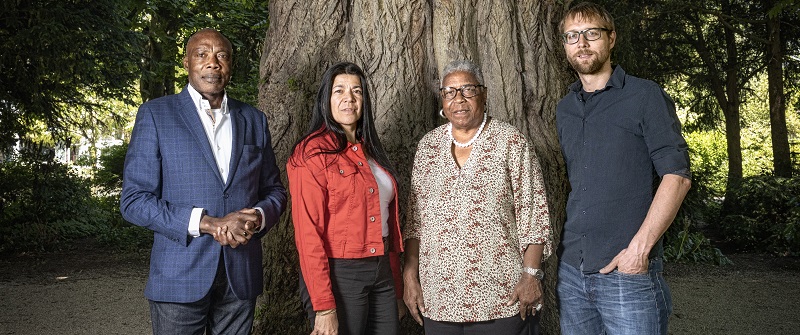
16 Jun Confronting study shows Dutch state’s involvement in colonial slavery and its continuing impact
The Dutch state was involved in colonial slavery in the Atlantic and Asian world in an intentional, systematic and sustained way. The impact and afterlives of this continue to affect the Netherlands and other countries all over the world. These are the conclusions drawn by researchers in Staat en slavernij: Het Nederlandse koloniale slavernijverleden en zijn doorwerkingen.
The book was presented to the Minister of the Interior and Kingdom Relations Hanke Bruins Slot on Thursday, 15 June. The minister responded by saying that the results of the research present “an uncomfortably difficult and sometimes downright shocking picture” of the Dutch state’s involvement in colonial slavery.
The book systematically examines the slavery history of the Netherlands and its afterlives, laying the foundation for a research agenda later this year. The study is part of a joint project carried out by the Royal Netherlands Institute of Southeast Asian and Caribbean Studies (KITLV), the International Institute of Social History (IISH), the National Institute for the Study of Dutch Slavery and its Legacy (NiNsee), and the University of Curaçao (UoC), at the request of the Dutch Ministry of the Interior and Kingdom Relations.
The findings of Staat en Slavernij
“Slavery was intentionally made a fundamental element of Dutch colonial expansion in Africa, the Americas and Asia. The Dutch state and its predecessors were directly responsible for this; they developed policy and oversaw and supported initiatives that made colonial slavery possible,” said Matthias van Rossum (Researcher, IISH).

“Many precursors of modern-day institutions played a prominent role in this, all the way from the States General to the navy and from the church to the royal family. Colonial slavery helped to give the Netherlands its economic advantage and led to fundamental changes within those societies around the world from which enslaved people were taken or that were formerly colonized”.
“This study shows that the wide-ranging afterlives of slavery and colonialism, such as racialization, legal inequality and cultural disadvantage, persist to this day. There are clear links, but these have often scarcely been explored. And yet the implications for the present are huge, not only when it comes to properly understanding the afterlives, but also, for instance, in terms of the image Dutch society has of itself. The issue of possible recovery and reparation is about much more than commemorations. It also involves addressing these afterlives of slavery”, explains Esther Captain (Researcher, KITLV).
Rose Mary Allen (Professor, UoC): “The impact of colonial slavery on the Caribbean parts of the Kingdom of the Netherlands is enormous, and has for a long time been the subject of little discussion and study. The effects of slavery did not disappear with its abolition. Staat en slavernij brings to light the different histories and afterlives of colonized countries. Simultaneously, this study points out the many cross-connections that exist – for example, those between slavery and other colonial instruments, such as other forms of forced labour, the legal system, language and education. It also highlights the interconnections between the various colonized territories”.
“This study is therefore not only relevant to Dutch society but also Suriname and other formerly colonized societies. This is because it shows how formative Dutch colonial slavery history has been and how much impact its effects continue to have,” stressed Urwin Vyent (Director, NiNsee).




No Comments